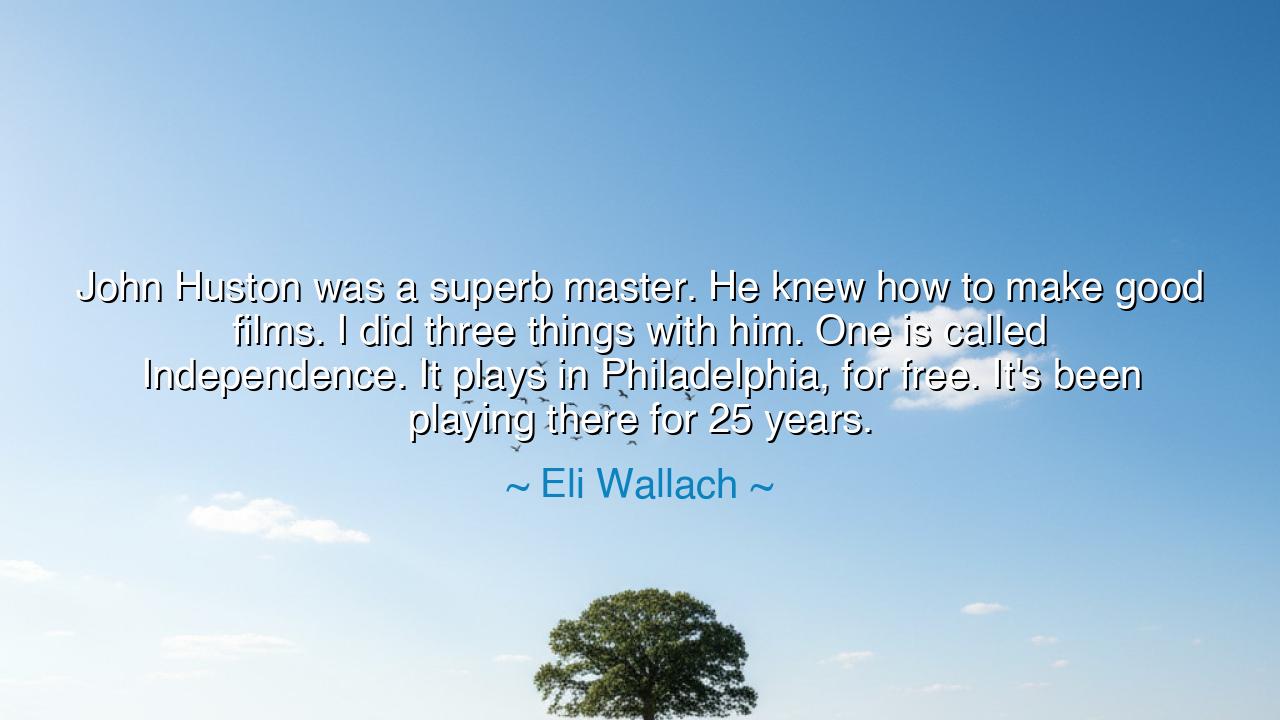
John Huston was a superb master. He knew how to make good films.
John Huston was a superb master. He knew how to make good films. I did three things with him. One is called Independence. It plays in Philadelphia, for free. It's been playing there for 25 years.






When Eli Wallach said, “John Huston was a superb master. He knew how to make good films. I did three things with him. One is called Independence. It plays in Philadelphia, for free. It's been playing there for 25 years,” he spoke not merely of cinema, but of art, mentorship, and legacy. His words, though humble and simple, carry the weight of reverence — the reverence of a craftsman honoring the master who shaped his path. Behind this brief recollection lies a deep truth: that art, when born from sincerity and vision, endures beyond time and commerce. Wallach’s tone is that of the ancient disciple who remembers his teacher — not for wealth or fame, but for the spirit he imparted.
The origin of this quote lies in Wallach’s reflections on his collaborations with the legendary director John Huston, one of the great architects of mid-twentieth-century cinema. Huston was not just a filmmaker — he was a philosopher behind the camera, a man who saw stories as living souls rather than mere entertainment. Among their collaborations was a short historical film titled Independence, directed by Huston in 1976 for the U.S. National Park Service. The film dramatized the signing of the Declaration of Independence, capturing the spirit of America’s birth through the performances of great actors like Wallach himself. For decades, it has played continuously at Independence Hall in Philadelphia, free to all visitors — a work of art given as a gift to the people, as enduring as the ideals it celebrates.
In this, there is a profound lesson about art’s true purpose. Huston, a “superb master,” did not measure greatness by fame or profit. He created stories that lived within the hearts of others, shaping how they saw the world. Wallach’s mention that the film “plays for free” is not a trivial detail — it is symbolic. It represents the purity of creation that serves humanity rather than ambition. Like the ancient sculptors who carved temples for the glory of gods rather than men, Huston and Wallach gave their craft to the service of something greater — the remembrance of freedom, the beauty of storytelling, and the endurance of truth.
The film Independence itself, though brief, embodies the spirit of America’s founding. It speaks of men who risked all for the sake of liberty, men whose words — “We hold these truths to be self-evident” — still echo through the centuries. For Wallach, to be part of that creation was to partake in a living tradition: to honor not only the birth of a nation, but the duty of the artist to preserve and renew that spirit for every generation. His praise of Huston is, therefore, more than admiration; it is gratitude — gratitude for a teacher who taught him how to turn history into poetry, and performance into remembrance.
We may hear in Wallach’s tone the eternal dialogue between student and master, which the ancients cherished. Just as Aristotle honored Plato, or as apprentices once honored the great painters of Florence, Wallach’s words remind us that wisdom and excellence are not born alone. The “superb master” does not impose his will; he awakens it in others. Huston’s greatness lay not only in his skill but in his ability to bring forth the best in those he directed — to make them see not just what they were, but what they could become. In this, Wallach himself became a vessel of his master’s art, carrying forward a lineage that transcended time.
There is also a quiet beauty in the fact that Independence plays endlessly, for decades, without ticket or price. It stands as a metaphor for the gift of art and freedom alike — things that can only retain their power when shared freely. Like the Declaration itself, it belongs to everyone. Wallach’s words thus remind us that the measure of greatness is not how long one is remembered, but how deeply one’s work continues to move the hearts of others. A film that plays for twenty-five years, unseen by critics yet cherished by the public, becomes an altar of quiet immortality.
So, my children of art and purpose, learn from the bond between Eli Wallach and John Huston. Seek not glory, but mastery. Work not for applause, but for meaning. Let your craft, whatever it may be, serve truth and endure beyond your own life. For when your labor becomes a gift, and your art a light that others may see freely — then, like the film Independence that still plays beneath the shadow of Independence Hall, your legacy will live not for twenty-five years, but for as long as there are hearts that yearn to be inspired.






AAdministratorAdministrator
Welcome, honored guests. Please leave a comment, we will respond soon